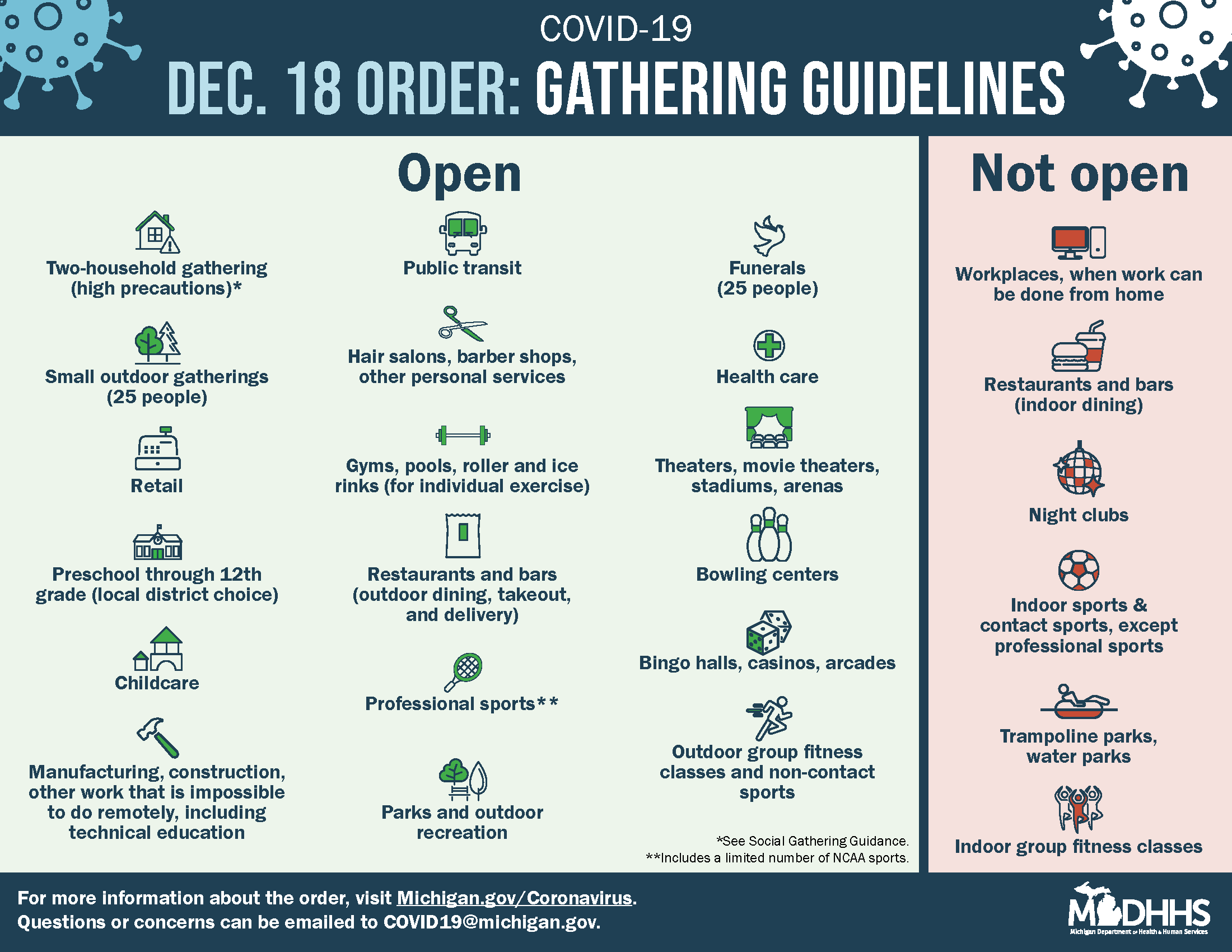Gatherings remain limited, but high schools, casinos, bowling alleys, theaters can reopen
FOR IMMEDIATE RELEASE
December 18, 2020
Contact: Lynn Sutfin, 517-241-2112
LANSING, MICH. The Michigan Department of Health and Human Services (MDHHS) updated its epidemic order today to allow indoor activities where Michiganders can remain masked, as this has been scientifically shown to slow the virus. This includes in-person learning at high schools and indoor entertainment venues. Casinos, bowling centers and movie theatres will be allowed to reopen with total capacity capped at 100; food and drink concessions closed; and social distancing requirements in place. The new order is effective Monday, Dec. 21 and will last until Friday, Jan. 15.
“These past few weeks, Michiganders across the state stepped up and did their part to slow the spread of COVID-19, and because of our collective hard work, we are now able to begin the steps to carefully lift some of the protocols we have in place,” said Gov. Gretchen Whitmer. “I am encouraged by the progress we have made since early November, and will continue to monitor the data closely during and after the holidays. One of the most important things Michiganders can do right now is make a plan to get the safe and effective vaccine as soon as it’s available to you. And as always: mask up, practice safe social distancing, and avoid indoor gatherings where COVID-19 can easily spread from person to person. We will eradicate this virus together.”
“We have made some progress in our fight against this pandemic, and this was a historical week as we started to distribute life-saving vaccines,” said Dr. Joneigh Khaldun, chief medical executive and chief deputy for health at MDHHS. “It is important that everyone continues to do their part. Start planning for when you will get a vaccine when it is available to you, and let’s avoid a surge in cases after the holidays by avoiding gatherings, wearing our masks, and continuing to socially distance.”
Previously, MDHHS had identified stabilization or declines in three metrics as critical for relaxing protocols. Michigan saw improvements across all three following the “pause” implemented in mid-November:
- Hospital capacity dedicated to COVID-19 patients:13-day decline; current capacity is at 17.3% for beds with COVID-19 patients. Peaked at 20.1% on Tuesday, Dec. 1.
- Overall case rates: 27-day decline; currently at 439 cases per million. Peaked at 739 cases per million on Saturday, Nov. 14.
- Positivity rate: 11-day decline; currently at 10.6% positive tests. Recently peaked at 14.3% on Friday, Dec. 4.
“Michiganders should be proud: we have made incredible progress over the last month. But we could easily lose that progress and endanger our hospitals again over the next two weeks,” said MDHHS Director Robert Gordon. “At Thanksgiving, most Michiganders sacrificed and avoided family get-togethers. We need to do the same thing this holiday season. Then we can re-engage more activities sooner and more safely.”
Indoor residential gatherings remain limited to 10 people and two households. MDHHS continues to urge families to avoid indoor gatherings or to pick a single other household to interact with consistent with guidance already released by the department. Families are encouraged to stay home this holiday season to maintain the positive momentum that has developed and to protect loved ones. Families are also encouraged to Mask Up, Mask Right, using new guidance for what masks to wear and how to wear them.

The epidemic order continues to temporarily pause indoor dining in bars and restaurants, but they can continue to offer outdoor dining, carry-out, and delivery. Colleges and universities will be able to have students return to campus for the winter semester, with a voluntary commitment to wait until Jan. 18 to restart in-person courses.
Gyms remain open for individual exercise with strict safety measures in place. Outdoor group fitness and outdoor non-contact sports will again be allowed, including running, downhill and cross-country skiing.
Under this new order, reopened indoor entertainment venues will not be required to collect names and contact information. With the amount of community spread that currently exists across the state and the heavy burden on contact tracing teams to keep up with these cases, it has become too challenging to meaningfully use this data for timely follow up. As case counts fall and contact tracing becomes able to keep up with the volume again, MDHHS expects to reinstate this information-gathering requirement.
As before, employees who work in jobs that cannot be performed from home can continue to go to work, while employees who can work from home should continue to do so. Individualized activities with distancing and face masks are still allowed: retail shopping; public transit; restaurant takeout; personal-care services such as haircuts, by appointment; and individualized exercise at a gym, with extra spacing between machines.
“As we continue to fight the COVID-19 pandemic, the health and safety of our employees and patrons remains a top priority,” said Joel Kincaid, vice president of operations with MJR Digital Cinemas. “We are grateful for MDHHS’s partnership and are prepared to reopen with strict safety measures in place. We look forward to working with the governor and her entire administration as we combat this virus together.”
Information around this outbreak is changing rapidly. The latest information is available at Michigan.gov/Coronavirus and CDC.gov/Coronavirus.
To learn more about the COVID-19 vaccine, visit Michigan.gov/COVIDVaccine.





 Each year, thousands of people greet the first day of January by joining America’s State Parks
Each year, thousands of people greet the first day of January by joining America’s State Parks  With winter now (officially) begun, many anglers are heading out to the ice for some frozen fishing fun. It’s important to make safety your top priority anytime you’re on the ice. Remember: there is no reliable “inch-thickness” to determine when ice is safe.
With winter now (officially) begun, many anglers are heading out to the ice for some frozen fishing fun. It’s important to make safety your top priority anytime you’re on the ice. Remember: there is no reliable “inch-thickness” to determine when ice is safe.




